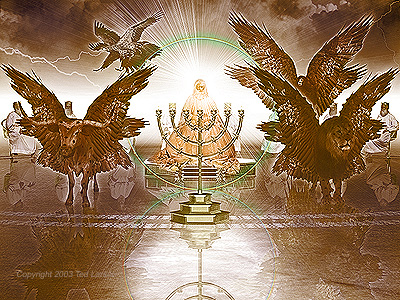
by Bret Capranica | Feb 17, 2011 | Biblical Studies, Featured Articles, Pastoral Ministry, Worship
Our passage for Sunday is Revelation 5:1-5. Stop and pray for insight, illumination, and wisdom in understanding and making use of this passage. Carefully Think How does this passage fit with chapter 4? How is this section different than chapter 4? Can you summarize what you think is the main idea? What is unique about Jesus in this passage? What is unique about God the Father in this passage? Who else/What else is mentioned/emphasized in the passage? What is the scroll found in the Father”™s hand? How do you know? What do you find in this passage that you cannot understand? What Old Testament concepts do you see mentioned here? Prayerfully Meditate What about Jesus is found here that would assist your worship of Jesus? Is there a song or hymn that uniquely expresses the worship of Jesus that you could sing, or meditate on? What unbelievers do you know who need to comprehend the uniqueness of Jesus? Pray for them by name. How could this passage assist you and others in our church this week when we gather together to worship Jesus? Actively Respond What could you do Saturday night and Sunday morning to prepare yourself to worship with God”™s people on Sunday? Go to our web-site and download a copy of the bulletin and begin to pray through every element of the service. Prepare your mind and heart to be sensitive on how you can serve or encourage someone when you arrive at worship on Sunday. From Revelation 5:1-5, is there any sin for you to confess, promise to confidently affirm, word of encouragement to...

by Bret Capranica | Feb 13, 2011 | Featured Articles, Pastoral Ministry, Preaching, Worship
How can you respond to this week’s sermon? You can hear the two sermons on Revelation 4:1-11 through our church’s web-site: Heaven Help Our Worship – The Atmosphere of Heaven – Rev 4:1-6 Heaven Help Our Worship – The Activity of Heaven – Rev 4:6-11 Revelation 4 is a brilliant description of God”™s supremacy and a picturesque vision of the purest worship of God. God”™s authority, centrality, mercy, redemption, judgment, omniscience, transcendence, and sovereignty are all stunningly described as the very atmosphere of heaven. The activity of heaven responds to God”™s blazing centrality with an intense, focused exaltation of who He is. Here is the pinnacle of corporate praise. The entire scene begs the question as to whether our weekly earthly gatherings mirror the emphases we see happening unceasingly in heaven. Our two sermons on Revelation 4 delved into the details of the passage and called us to consider how central God is in our affections, our vocabulary, our prayers, our music, our conversations, and our mindset when we gather with God”™s people on the Lord”™s Day. How can we grow in our worship of God on earth so that our gatherings are more reflective of the worship that happens in heaven? Something to Know Increase your understanding of who God is Simply reading through the Bible, particularly the Old Testament has helped me with this. For example, while reading through Old Testament books, underline every time the narrator (in the historical books) indicates that God did something. You will be amazed at what God does ““ and thus see His attributes on display. Read some excellent books on...

by Bret Capranica | Mar 2, 2010 | The Gospel
John Stott suggests our approach to worship, and thus the cross, may be filled with too much levity. What do you think of his comments: Unhappily, even in the church we seem to have lost the vision of the majesty of God. There is much shallowness and levity among us. Prophets and psalmists would probably say of us that “there is no fear of God before their eyes.” In public worship our habit is to slouch or squat; we do not kneel nowadays, let alone prostrate ourselves in humility before God. It is more characteristic of us to clap our hands with joy than to blush with shame or tears. We saunter up to God to claim his patronage and friendship; it does not occur to us that he might send us away. It must be said that our evangelical emphasis on the atonement is dangerous if we come to it too quickly. We learn to appreciate the access to God that Christ has won for us only after we have first seen God’s inaccessibility to sinners. We can cry “Hallelujah” with authenticity only after we have first cried “Woe is me, for I am lost.” As Brunner put it, “where the idea of the wrath of God is ignored, there also will there be no understanding of the central conception of the Gospel: the uniqueness of the revelation in the Mediator.” Similarly, “only he who knows the greatness of wrath will be mastered by the greatness of mercy.” If we bring God down to our level and raise ourselves to his then of course we see no need...

by Bret Capranica | Sep 10, 2009 | Featured Articles, Prayer
So, what do you do when you actually get to the point when it’s time to pray? What do you say? How do you stay focused without being so rigid that your prayer life feels little more than sitting on Santa’s knee telling him what you want for Christmas? Worship. By worship I don’t necessarily mean singing or listening to “worship music” (however that gets defined). I do mean spending a healthy amount of time seriously considering, rehearsing, and enjoying who God is. Thinking again about Christ and why He died and rose from the dead. Considering what are the very powerful implications of the Son of God dying in my place. I need to linger longer in worship. In fact, one of the greatest men of prayer I have ever known, caught my attention when he said in a lecture on prayer, that later in his life he found himself spending more time worshiping than asking. For him that did not mean sitting cross-legged and humming choruses from the 1970s. It was not some form of Christianized yoga. It meant reminding himself (primarily by means of reading the Scripture) of who God was and how His character was being expressed in his life. This shouldn’t be rocket science. Jesus informed the disciples that the opening elements of how they should pray should be comprised fundamentally of worship – hallowing the name of “God our Father.” Perhaps this was Job’s greatest challenge as well as He begged God for an answer to the reason behind his life-wrenching trials. By the end of the book, Job’s hand is over his...
by Bret Capranica | Aug 23, 2009 | Ecclesiology, Technology
Really? Can we really worship biblically with the church simply through our iPhone? How does this not deny the very meaning of “Church?” Fla. Megachurch Brings Worship to the iPhone |...











